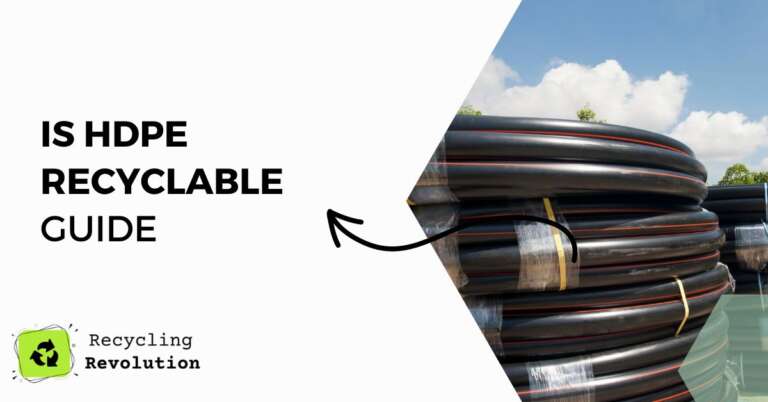The question of whether high-density polyethylene (HDPE) is recyclable is not as simple as it seems. Based on my extensive experience in the field, I can confidently say that HDPE is indeed recyclable.
TL;DR: HDPE, a commonly used plastic, is absolutely recyclable and is, in fact, one of the most recycled plastics globally. However, effective recycling depends on several factors, including appropriate collection, sorting, and processing facilities.
The Lowdown on HDPE
HDPE is a versatile and widely used plastic, most recognized in its form as milk jugs, shampoo bottles, and detergent containers. It’s known for its strength, durability, and resistance to moisture and chemicals. But what makes HDPE truly standout is its recyclability.
The Environmental Impact of HDPE
Understanding the environmental impact of HDPE is essential to fully comprehend the importance of its recycling. It might be worthwhile to consider that every plastic we recycle, including HDPE, helps to conserve natural resources, notably petroleum which is a crucial component in plastic manufacturing.
Moreover, the recycling of HDPE reduces the amount of plastic waste that ends up in our landfills or, even worse, our natural environment. Each year, mismanaged plastic waste contributes to severe environmental problems, such as ocean pollution and harm to wildlife. By recycling HDPE, we are not only reducing landfill waste but also preventing the contamination of our ecosystems.
HDPE and Recycling
As I’ve mentioned, HDPE is 100% recyclable. Its recyclability score is quite high due to its minimal degradation during the recycling process, which makes it suitable for repeated use.
Here’s a simple breakdown of the HDPE recycling process:
- Collection: HDPE products are gathered from various sources like households, businesses, and recycling centers.
- Sorting: Collected HDPE materials are sorted based on their color and type.
- Cleaning: The sorted HDPE items are cleaned to remove any contaminants or residues.
- Shredding: The clean HDPE products are shredded into tiny pieces.
- Melting and Reforming: The shredded pieces are then melted and reformed into pellets, ready to be used for the production of new HDPE products.
However, it’s essential to remember that effective HDPE recycling is heavily dependent on several factors, particularly the correct collection and sorting of waste. Improperly sorted waste can lead to contamination, which reduces the quality and marketability of recycled HDPE.
Maximizing HDPE Recycling
Recycling doesn’t just stop at putting your HDPE waste into a recycling bin. You also have a role to play to ensure its effective recycling. A useful suggestion would be to:
- Rinse your HDPE containers before placing them in your recycling bin. This step minimizes contamination and makes the recycling process more efficient.
- Be aware of local recycling rules. Some recycling programs may only accept certain types of HDPE products, so it’s crucial to check your local recycling guidelines.
Market for Recycled HDPE
As an experienced in recycling, I can confidently say that the market for recycled HDPE is thriving. This robust market primarily stems from the plastic’s durability, versatility, and high recyclability score. Recycled HDPE finds its use in a variety of applications, such as the manufacturing of plastic lumber, bins, pipes, bottles, and even toys.
The demand for recycled HDPE is growing due to an increased global focus on sustainability and resource conservation. Many companies have started to recognize the value of using recycled materials and are incorporating recycled HDPE into their products. The trend of ‘green consumerism’ has further fueled the demand for these eco-friendly products.
Recycling HDPE vs. Other Plastics
When compared to other plastics, HDPE stands out for its high recyclability. Plastics like PVC, for instance, pose more challenges in recycling due to their higher risk of releasing harmful chemicals during the process. On the other hand, HDPE, identified by its recycling code ‘2’, goes through the recycling process with minimal degradation of material quality.
However, just like any other plastic, the effectiveness of recycling HDPE heavily depends on proper sorting and cleaning to avoid contamination. And while HDPE recycling has its advantages, it does not eliminate the need to reduce overall plastic consumption.
The Future of HDPE Recycling
Looking ahead, the future of HDPE recycling is filled with promise. Innovations are underway to improve the efficiency and output quality of HDPE recycling.
Chemical recycling, which breaks down plastic into its original monomers for reuse, is seen as a potentially game-changing technology. If successful, it could open the door to infinitely recyclable HDPE, fundamentally altering our approach to plastic waste.
Alternative Solutions
While recycling HDPE is a great way to reduce waste, it might be worthwhile to consider other strategies to minimize our plastic footprint. For instance, opting for reusable items over single-use HDPE products or choosing products packaged in biodegradable materials could significantly reduce our dependence on plastic.
Conclusion
So, is HDPE recyclable? The definitive answer is a resounding yes. However, the success of recycling HDPE, or any material for that matter, relies on not just recycling facilities but also our actions as consumers.
By understanding the recycling process, adhering to recycling guidelines, and exploring alternative solutions, we can help maximize the recyclability of HDPE and pave the way towards a more sustainable future.
FAQ
What products are made from recycled HDPE?
Recycled HDPE can be used to make a wide array of products, such as plastic lumber, outdoor furniture, drainage pipes, and more HDPE containers.
Can HDPE be recycled indefinitely?
While HDPE is recyclable, it can’t be recycled indefinitely. The quality of plastic diminishes with each recycling cycle, eventually leading to downcycling, where it is used to produce items of lesser value.
Are all HDPE products recyclable?
While HDPE itself is recyclable, not all HDPE products are accepted in all recycling programs due to contamination from food or other substances. It’s best to check with local recycling facilities.
How can I identify HDPE products?
HDPE products can typically be identified by the plastic resin code ‘2’ within the recycling symbol.

